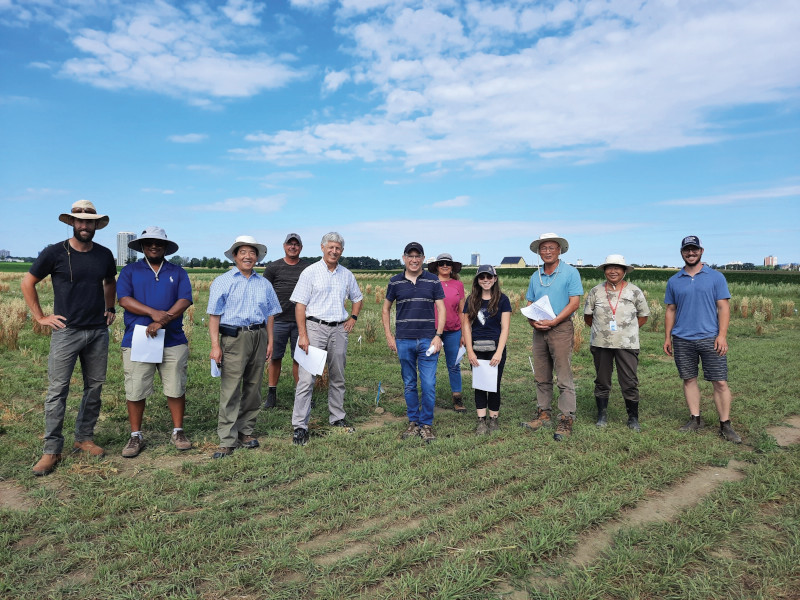
NATIONAL
2013 Brings New Moisture Specifications for Food Class Barley
On July 1, 2013, new moisture specifications for food class barley take effect in Eastern Canada. The same changes take effect in Western Canada on Aug. 1, 2013. The Eastern and Western Standards Committees recommended the following moisture specifications for dry grain for barley, Canada Western/Canada Eastern Food:
• food barley, covered—13.5 per cent
• food barley, hulless—14.0 per cent
Currently, the moisture specification for dry grain for barley in the food class is 14.8 per cent for both covered and hulless varieties.
Western Solin to be Removed as an Official Grain
On Aug. 1, 2013, Canada Western Solin will be removed from the list of official grains of Canada and will no longer be regulated under the Canada Grain Act. Solin, an oilseed crop that is sometimes called linola, became an official grain in 1995. It was grown, marketed and handled under contract with Viterra. Solin has not been in production for approximately five years, and there are no intentions of introducing it back into the market.
CGC Wheat Classes Changing
The Canadian Grain Commission is reminding grain producers and industry stakeholders that effective Aug. 1, 2013, the following wheat varieties move from the Canada Western Red Winter to the Canada Western General Purpose class: CDC Kestrel, CDC Clair, CDC Harrier and CDC Raptor. CDC Falcon, currently a CWRW variety, is proposed to move to the CWGP class on Aug. 1, 2014.
Alternative Service Delivery of Seed Crop Inspection
The Canadian Food Inspection Agency is working to transfer seed crop inspection services to an alternative delivery mechanism as one of the government of Canada’s decisions under budget 2012. The CFIA will maintain its role as Canada’s national seed authority and will continue to be involved in activities in support of seed crop inspection and certification including licensing and oversight of private sector delivery of seed crop inspection. A seed industry-government working group is developing a national framework to assist the seed sector to move towards ASD of seed crop inspection.
Monsanto Receives Approvals of Two New Products
Monsanto Canada has introduced the future of high-yielding canola, unveiling the benefits of its new TruFlex Roundup Ready canola to western Canadian farmers. The Canadian Food Inspection Agency and Health Canada granted full food, feed and environmental safety approval to the new trait in June 2012, and Monsanto anticipates a commercial preview to farmers in 2014. TruFlex RR canola will serve as the base platform on which all future Monsanto pipeline traits in canola will be stacked.
Monsanto has also received full regulatory approval in Canada for Genuity Roundup Ready 2 Xtend soybeans, the industry’s first biotech product with herbicide tolerance to both glyphosate and dicamba. This new soybean product will be a component of the new Roundup Ready Xtend Crop System, providing soybean growers with greater flexibility in weed control to help maximize yield potential. Pending key global import and regulatory approvals, Monsanto anticipates commercial release for the 2014 growing season.
INTERNATIONAL
CFIA Reviews Phytosanitary Import Requirements
As the Canadian Food Inspection Agency continues to seek and review comments to its draft directives, “D-12-04 Phytosanitary import requirements for grain of field crops including pulses, oilseeds, cereals (other than barley, oat, rye, triticale and wheat), forages and other special crops from all origins except the continental United States” and “D-12-05 Phytosanitary import requirements for grain of field crops including pulses, oilseeds, cereals (other than barley, oats, rye, triticale and wheat), forages, and other special crops from the continental United States,” the CFIA has decided to further provide industry and trading partners the opportunity to comment. During this time, the CFIA will continue to engage in dialogue with industry stakeholders.
Organic Equivalency Further Supports Canadian Exports
Canadian organic producers will have increased opportunities to export their products and Canadian families shopping for organic food will have more choices following an arrangement reached between Canada and Switzerland. The Canada-Switzerland Organic Equivalency Arrangement is the outcome of an extensive analysis of both countries’ production and certification systems. The arrangement will allow for easier import and export of certified organic products between Canada and Switzerland without the need for additional certification, thus reducing costs and red tape.
USDA Proposes Updates to Plant Import Regulations
The United States Department of Agriculture’s Animal and Plant Health Inspection Service is proposing to make several amendments to update and streamline its regulations involving the importation of plants for planting. “These proposed changes are necessary to relieve certain restrictions, update existing provisions, and to make the regulations easier to understand and implement,” said Rebecca Bech, deputy administrator of APHIS’ Plant Protection and Quarantine program. Some of these proposed changes include requiring permits for the importation of certain coated or pelleted seeds, and providing for an alternate additional declaration on phytosanitary certificates that accompany plants from countries known to have potato cyst nematodes. The proposed regulations also change provisions specific to certain countries, to ensure they reflect the latest information regarding quarantine pests detected in various places. For example, they would add conditions for the importation of certain plants from Canada to address the presence of plum pox potyvirus in that country.











